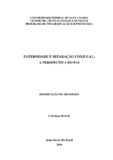| dc.creator | Bottoli, Cristiane | |
| dc.date.accessioned | 2011-02-22 | |
| dc.date.available | 2011-02-22 | |
| dc.date.issued | 2010-12-03 | |
| dc.identifier.citation | BOTTOLI, Cristiane. Paternity and conjugal separation: perspective of the father. 2010. 141 f. Dissertação (Mestrado em Psicologia) - Universidade Federal de Santa Maria, Santa Maria, 2010. | por |
| dc.identifier.uri | http://repositorio.ufsm.br/handle/1/10294 | |
| dc.description.abstract | This research had as an objective to understand how paternity constitute itself in the conjugal separation and children guard context, throughout the fatherly figure for understanding that separation historically represents to fathers a moment where they are separated of their children. The research has a qualitative character and seeked to know more about the theme and to do so it‟s been developed semi-structured interviews with seven fathers that were going through the separation process and that for such reason seeked counselling at two juridical practice places that attend the community, in Santa Maria city. After the interviews had been done, a Content Analysis of the same had been applied which made it possible to stablish the following categories: being a father; conjugality and parenthood; guard; loss and suffer; the arising of a new father. The results point out that the conjugal separation has constituted itself as a moment that modifies the paternity exercise, in which meaningful differences occur in before and after mainly in regards to proximity with children and issues involving a relationship with ex-wife. Aspects that point out to inherent conflicts to the end of Conjugality and the maintenance of Parenthood were also identified. Other aspect that had been shown was the expressed desire by the fathers to be present in different moments in the children daily life. In regards to children guard it‟s been noticed a movement of the interviewed fathers in the sense to enlarge their participation. The same way the recognition of the maternal figure was present as that whom is naturally assigned to occupy this place. It can also be mentioned that the interviewed fathers have been seeked to built and rebuilt paternity at all moments, which is characteristical in the contemporary paternity exercise that considers a participative and present father. It‟s understood that the comprehension of this family reality throughout the father‟s point of view allowed to enlarge a glimpse over the phenomenum and made it possible a large understanding of the family‟s relationships dynamics in a current context. | eng |
| dc.format | application/pdf | por |
| dc.language | por | por |
| dc.publisher | Universidade Federal de Santa Maria | por |
| dc.rights | Acesso Aberto | por |
| dc.subject | Paternidade | por |
| dc.subject | Separação conjugal | por |
| dc.subject | Guarda | por |
| dc.subject | Parentalidade | por |
| dc.subject | Família | por |
| dc.subject | Paternity | eng |
| dc.subject | Conjugal separation | eng |
| dc.subject | Guard | eng |
| dc.subject | Parenthood | eng |
| dc.subject | Family | eng |
| dc.title | Paternidade e separação conjugal: a perspectiva do pai | por |
| dc.title.alternative | Paternity and conjugal separation: perspective of the father | eng |
| dc.type | Dissertação | por |
| dc.description.resumo | Esta pesquisa objetivou conhecer a forma como a paternidade se constitui no contexto da separação e da guarda dos filhos, a partir da perspectiva da figura paterna, entendendo-se que, para o pai, o momento da separação conjugal, historicamente, também caracteriza a separação dos filhos. A pesquisa realizada foi de caráter qualitativo e buscou aprofundar o conhecimento acerca do tema, através de entrevistas semiestruturadas, com sete pais que vivenciavam o processo de separação e por essa razão buscaram atendimento, junto a dois locais de práticas jurídicas que atendem a comunidade, na cidade de Santa Maria, RS. Após a realização das entrevistas efetuou-se a Análise de Conteúdo das mesmas e foram estabelecidas as seguintes categorias: Ser Pai; Conjugalidade e Parentalidade; Guarda; Perdas e Sofrimentos; O Surgimento de um Novo Pai. Os resultados apontam que a separação conjugal tem se constituído como um momento que modifica o exercício da paternidade, onde ocorrem diferenças significativas no antes e no depois, principalmente em relação à proximidade com os filhos e a questões envolvendo o relacionamento com a ex-mulher. São evidenciados aspectos que apontam para conflitos inerentes ao fim da Conjugalidade e a manutenção da Parentalidade. Também se destacou o desejo expresso pelos pais de estarem presentes em diversos momentos na vida cotidiana dos filhos. Com relação à guarda dos filhos, percebeu-se um movimento por parte dos pais entrevistados no sentido de ampliar sua participação. Da mesma forma, esteve presente o reconhecimento da figura materna como aquela que está naturalmente designada para ocupar este lugar. Destaca-se ainda que os pais entrevistados tenham buscado construir e reconstruir a paternidade a todo o momento, características contemporâneas no exercício da paternidade, com um pai mais presente e participativo. Entende-se que a compreensão desta realidade familiar a partir do ponto de vista do pai, permitiu ampliar o olhar sobre o fenômeno e possibilitou um maior entendimento da dinâmica das relações familiares no contexto atual. | por |
| dc.contributor.advisor1 | Arpini, Dorian Mônica | |
| dc.contributor.advisor1Lattes | http://lattes.cnpq.br/7359875094778140 | por |
| dc.contributor.referee1 | Wagner, Adriana | |
| dc.contributor.referee1Lattes | http://lattes.cnpq.br/0683206038422853 | por |
| dc.contributor.referee2 | Dias, Ana Cristina Garcia | |
| dc.contributor.referee2Lattes | http://lattes.cnpq.br/4485625659677820 | por |
| dc.creator.Lattes | http://lattes.cnpq.br/4135453669308407 | por |
| dc.publisher.country | BR | por |
| dc.publisher.department | Psicologia | por |
| dc.publisher.initials | UFSM | por |
| dc.publisher.program | Programa de Pós-Graduação em Psicologia | por |
| dc.subject.cnpq | CNPQ::CIENCIAS HUMANAS::PSICOLOGIA | por |


